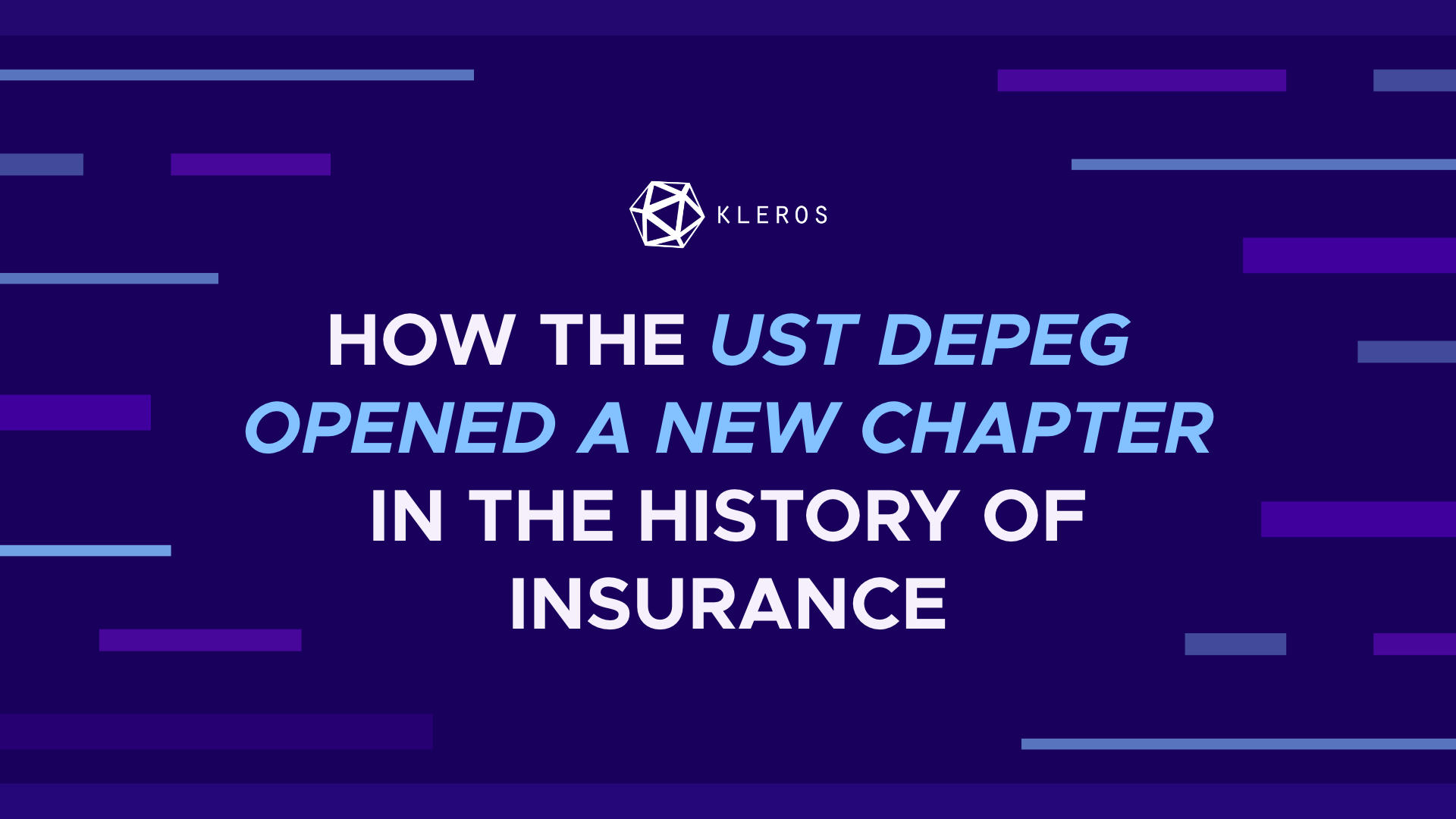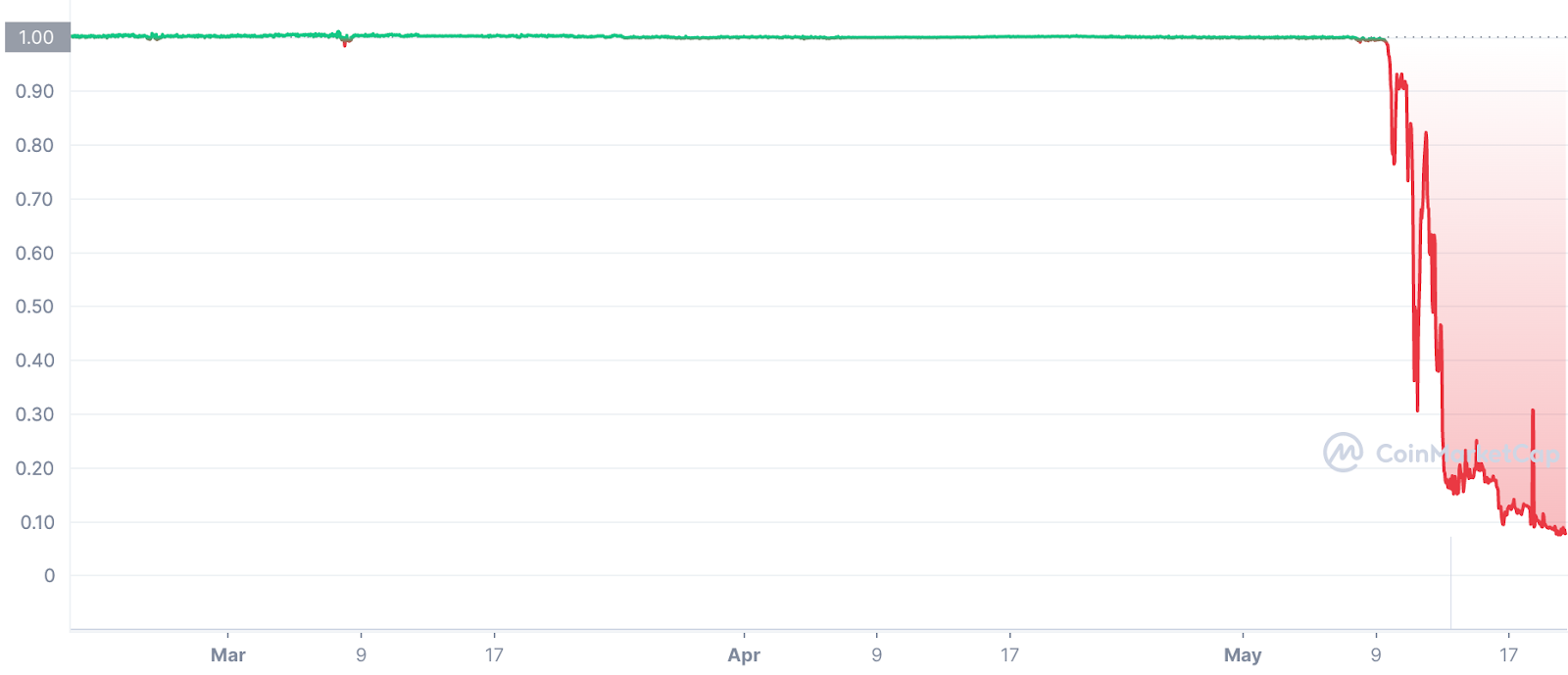How the UST Depeg Opened a New Chapter in the History of Insurance
When decentralized insurance claims meet decentralized justice protocols...

When decentralized insurance meets decentralized justice ...
The 10th of May 2022 will go down as the beginning of one of the most tense series of events in crypto history. It marked the day that the price of the UST stablecoin started its cascade, and in its desperate struggle towards the $1 mark, dragged its sister currency LUNA (now LUNC) down together into a precipitous death spiral.
The price of prompted UST dropped under $0.10 within a week, and then went on to a slow but erratic decline to less than $0.04 by the end of May. LUNC’s decline was several orders of magnitude bigger, dropping from around $80 at the start of the month to less than $0.0002 by month’s end.
This represented a destruction of around $60 billion in value for token holders of the Terra ecosystem, and hundreds of billions for the broader Web3 industry brought about by the accompanying market crash.
These events have had a huge impact on the industry. Besides leading to increased calls for the regulation of stablecoins to prevent such calamities, it has also brought renewed attention to a class of services whose necessity unfortunately only becomes apparent in the wake of such calamities: insurance.
Though the dust has barely settled, it’s already clear that the industry will look back at the UST depeg as the event that ushered in a new era in the world of (decentralized) finance, triggering the first large wave of decentralized insurance claims in history.

For an industry that is barely over a year old, the UST depeg has already dwarfed all prior incidents in claim numbers. Of the 84 claims Unslashed Finance has received since its inception (at the time of writing), 82 of them came in just in the last few weeks as a result of the UST depeg. Likewise for InsurAce, UST depeg related claims made up for more than 170 of the 210 claims to date.
Solving Claims in Decentralized Insurance
DeFi insurances are mostly organized as mutuals, in which the capital for coverage is provided by the members of the DAO (e.g. staking in their pools). Cover can then be purchased by users for a premium, which would insure them against losses for a certain period of time, up to a certain amount in damages/losses.
While some of these protocols offer parametric coverage for their policyholders (paying amounts tied to the occurrence or magnitude of events as in the case of Solace Finance), most of them offer indemnity products that insures against the actual losses stemming from events such as exchange hacks, stablecoin depegs and smart contract exploits (e.g. Unslashed Finance, InsurAce, Nexus Mutual). An actual example is that for the potential depegging of the UST from the USD, through which insurees are indemnified against losses if a depeg actually happens (provided the criteria in the claim policy are fulfilled, as in this example from Unslashed).
With the incidents in the past month, this has also become the first time decentralized insurance has been entrusted with the compensation of significant numbers of retail users. The anxiety among insurees are understandably high, which is compounded by the perceived reverse agency problem - an unresolved tension between the obligation of the insurance DAOs to protect the capital of their mutuals, and their (conflicting) duty to use the same capital to pay out claims to legitimate claimants (a topic discussed in more detail in this other article).
Unslashed was one of the first protocols that recognized this problem and reached out to Kleros to work on a new way of arbitrating such claims in a fair, transparent and efficient manner.
The integration born out of this collaboration has now become the blueprint for building any fair and independent arbitration process for decentralized insurance claims:
- A user purchases cover through Unslashed for a certain period and cover amount.
- If a claimable event occurred, a policyholder can file for compensation under the policy (provided the criteria in the policy are fulfilled).
- There’s a review period during which any user can challenge the claim if they think it doesn’t comply with the claim policy.
- If there’s no challenge, the claim is accepted and the payout is executed.
- If someone challenges the claim, a dispute is created in Kleros as a decentralized court case. Kleros jurors will then decide if the claim should be paid out or not.
This design allows the entire insurance product to be decentralized end-to-end, allowing any user to participate as an insurer, insuree, capital provider, claim verifier or resolver.
With more than 80 claims already submitted at the time of writing, Kleros has already helped Unslashed secure several million dollars worth of claims. Several of these claims have already been passed to Kleros for arbitration, with various sides presenting well developed arguments for and against the payment of these claims (see for example cases #1197, #1198 and #1200).
The road Ahead
The current amounts covered by the DeFi insurance industry (e.g. around $330 million by Nexus Mutual, $341 million by InsurAce and $68 million by Unslashed) are still small compared to the $50 billion worth of value locked in DeFi as of May 2022. As the crypto ecosystem grows larger and more complex, the role of the burgeoning decentralized insurance industry is expected to grow exponentially in the coming years.
We at Kleros strongly believe that decentralized insurance is an indispensable public good for the Web3 community and are taking the lead in the research and solution design of dispute resolution setups in the (decentralized) insurance industry.
Here are a number of our focus areas:
- Research into the game theory and incentive mechanisms involved in high-value insurance claims
- Optimization of our frontends and dApps to support better display of complex evidence and arguments.
- Formulation of guidelines for better policies for these types of claims, resulting in clear and fairer rules on whether a claim should be paid out.
- Education and cultivation of specialized (juror) communities skilled in the resolution of decentralized insurance claims.
We are always on the lookout for potential partners and contributors to work with to help us to further user protection on Web3. Whether you are part of an insurance protocol, a provider looking to collaborate on development or research or looking to join our team, do not hesitate to reach out to us at integration@kleros.io!

